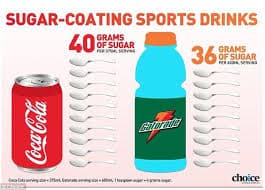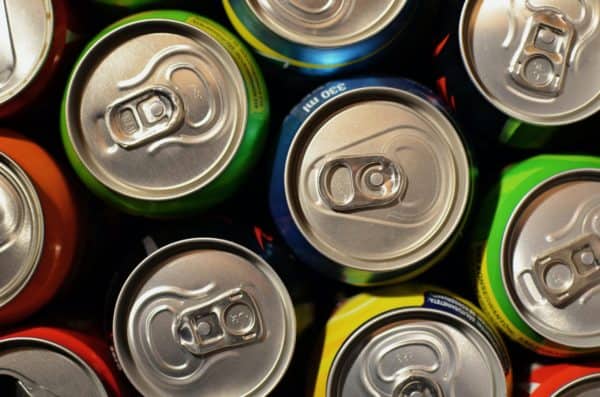4 Good Reasons to Give up Pop (and other sugary drinks)

We’ll admit, drinking an occasional soda is likely not a health risk for most people, however, regular consumption (e.g., one or two daily) can add up to potential health trouble over the long run. Recent studies have shown that over-consumption of soda and other sugar-sweetened beverages has been linked to an increased risk of a variety of diseases and health conditions, some of which can pose serious health complications. Today I want to share with you, 4 good reasons why you should replace those sugary drinks with water (ideally) or unsweetened coffee/tea.
1. Sugar-sweetened beverage intake can lead to an increased risk of type-2 diabetes mellitus and cardiovascular disease.
A review published in a 2010 issue of Circulation reported, “SSBs may increase type-2 diabetes mellitus and cardiovascular risk independently of obesity as a potential contributor to a high dietary glycemic load and increased fructose metabolism, leading to inflammation, insulin resistance, and high blood pressure, as well as accumulation of visceral adiposity/ectopic fat and atherogenic dyslipidemia. For these reasons and because they have little nutritional value, intake of soda and other sugar-sweetened beverages should be limited, and should be replaced by healthy alternatives such as water.” (see reference 1)
Basically, all of that sugar is wreaking absolute havoc in your body and causing your organ systems a lot of grief! Let’s think about it…is that sugar bomb in a can really worth the spiking insulin levels, increases in systemic inflammation, accumulation of internal fat, and problems with your heart and blood vessels? I don’t think so.
2. Weight loss benefits
It has been reported that “soda and other sugar-sweetened beverages are the greatest contributor to added-sugar intake in the United States and these kinds of drinks are thought to promote weight gain in part because of incomplete compensation for liquid calories at subsequent meals. Drinking too much soda has been linked to a higher risk of obesity due to its calorie and sugar content. Most sodas contain about 150 calories per serving (mostly from sugar), and according to the Harvard School of Public Health, drinking one can of regular soda per day without making any other changes to diet can result in a 15 lb. weight gain each year. In fact, a 20 oz size soda such as those served in restaurants or fast food places jumps the calorie content to about 250 calories. In contrast, cutting back on soda reduces calorie intake and aids weight loss efforts.” (see reference 2)
3. Some drinks contain potentially toxic chemicals/additives.
According to CSPI (Center for Science in the Public Interest), “Most artificial colourings are synthetic chemicals that do not occur in nature. Because such colourings are used almost solely in foods of low nutritional value (candy, soda pop, gelatin desserts, etc.), you should simply avoid all artificially coloured foods.” (see reference 3) Some examples of artificial colourings that can be found in beverages include: blue 2, green 3, and yellow 6. Although the research on artificial colourings has been primarily carried out in animal studies thus far, these chemicals may be substances you choose not to ingest on a regular basis.

In June of this year, CSPI also noted that “new laboratory tests show alarming levels of the cancer-causing chemical 4 methylimidizole (4-MI) in Coca-Cola sold around the world.” (see reference 4) The carcinogen of concern forms when the ammoniated caramel coloring used in colas is industrially produced.”
For example, the report stated that Coca-Cola obtained from Brazil had 267 micrograms (mcg) of the carcinogen per 12 fluid ounces (355 ml), whereas Cokes marketed in Canada, the United Arab Emirates, Mexico, and the United Kingdom had between 144 mcg and 160 mcg per 12 ounces. To put those levels into context, the state of California requires a cancer-warning label if a food would lead to people consuming 30 mcg or more of 4-MI per day. Thus, people drinking one 12-ounce soda per day would ingest that much if the soda contained 30 mcg or more of 4-MI. The state estimates that that amount of 4-MI would cause cancer in one in 100,000 people over their lifetimes. Hmmm…something to think about….
4. Kids eat more veggies
Kids eat more veggies? What parent wouldn’t love that? A 2012 study published in the journal Appetite (see reference 5) tested 75 children, ages three to five, who were served either a sweetened beverage or plain water with their vegetable snacks on multiple trials. The results showed that preschoolers in the trials ate more raw vegetables, either carrots or red peppers, when they were served water instead of a sweetened beverage. The authors concluded that “since our food-pairing penchants are indoctrinated early on, parents should urge their kids to drink water with their meals and policymakers should champion water as the default beverage option in restaurant combo deals.”
Well friends, in these last few weeks of summer let’s make an effort to ditch the soda, energy drinks, and sugar-laden iced-coffees and get drinking more water. In the next week or two, Dr. Puhl will be posting an article that discusses the benefits of drinking water and he’ll explain just how much we should be aiming for each day. Until then, hydrate wisely!
References:
1. http://circ.ahajournals.org/content/121/11/1356.full?
2. http://www.livestrong.com/article/366513-does-replacing-soda-with-water-help-with-weight-loss/#ixzz23M9ZjXep
3. http://www.cspinet.org/reports/chemcuisine.htm
4. http://www.cspinet.org/new/201206261.html
5. http://www.sciencedirect.com/science/article/pii/S0195666312001572

